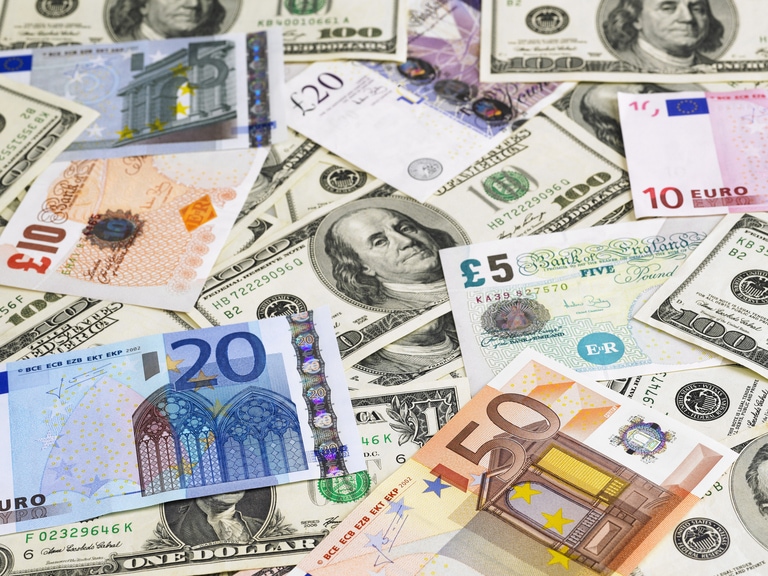Markets in Europe tried to move higher in early trade, but turned lower during the afternoon session, with today’s weakness coinciding with comments from Republican House Speaker Kevin McCarthy that no progress had been made on some of the key issues with respect to the debt ceiling.
Europe
Coming on the back of disappointing Chinese retail sales numbers which are weighing on luxury retail and basic resources, there's been little reason to buy stocks today, with the FTSE100 underperforming.
The UK index isn’t being helped by Vodafone, which is the worst performer, its shares dropping sharply to a 16 year low after the telecoms company announced it was looking to cut 11k jobs over the next 3 years, while reporting a 0.3% rise in group revenue to €45.7bn.
New CEO Margherita Della Valle unveiled the latest plan to turn the business around, as performance in its main markets continued to disappoint, with Spain and Italy seeing annual declines of 5.4% and 2.9% respectively in organic service revenue, driven by sharp declines in mobile customers.
How Vodafone must be ruing the decision to reject the €11bn bid by Iliad for its underperforming Italian business, which felt like a mistake at the time, although there has been talk in recent months that talks are still going on. Germany also saw a decline of 1.6%, driven by the loss of broadband customers, while the UK did much better, seeing an increase of 5.6% which was driven by an 8% increase in mobile service revenue.
Full year pre-tax profit for the year rose to €12.82bn, however most of this was down to the gains from the disposal of the Vantage Towers business, of €8.6bn. Vodafone also generated an additional €689m from the completion of the sale of its Ghana business, as well as a loss of €69m on its disposal of Vodafone Hungary.
Vodafone has made progress on reducing its debt which has fallen by almost 20% to €33.37bn, however investors seem less than impressed with today’s announcement.
Ocado is also lower after Goldman Sachs lowered its price target to 450p from 550p
Also under pressure is B&Q owner Kingfisher, on the back of a negative read across from US peer Home Depot’s fiscal year downgrade.
Imperial Brands have seen an unenthusiastic reaction to their H1 numbers, even as NGP revenue came in ahead of expectations, rising by 19.8%. The company said it was on course to meet its full year guidance.
On the plus side we’ve seen gains in commercial real estate today, a sector that has been in the news recently given the problems being seen in the US banking sector on the regional level, which have been caused by the recent sharp rises in interest rates.
These have been laid bare in Land Securities numbers which have seen the company slide to a full year loss of £622m after marking down the value of its property portfolio by £848m to reflect lower valuations. Despite today’s loss, rental revenue rose to £791m, up from £679m the prior year, which has helped lift the shares and the sector to the top of the FTSE100.
Rolls-Royce shares have edged a little higher after their recent weakness after a broker upgrade from Jefferies.
Boohoo shares have seen some gains today, although they are well off their intraday highs, despite posting a 11% decline in full year revenue to £1.77bn, and a loss before tax of £90.7m. Gross margin also declined to 50.6%, however the revenue numbers were still 43% higher than in 2020. The online retailer has been able to reduce its excess inventory while also taking steps to improve the oversight of its suppliers, which has pushed up its costs. On the plus side it has managed to consolidate its market share gains, and says it remains optimistic that profitability will improve as it looks to strengthen its balance sheet.
US
US markets opened slightly lower after retail sales in April rose by 0.4%, coming in below expectations of a rise of 0.8%.
Comments from House Speaker Kevin McCarthy that there had been no progress on debt ceiling talks in contrast to more recent optimistic comments from Lael Brainard has seen markets drift lower.
Sentiment hasn’t been helped by some disappointing Q1 numbers from DIY retailer Home Depot haven’t helped either, and have slipped below their March lows after the company downgraded its full year outlook again. In February, the retailer downgraded its outlook to forecast flat sales growth for 2023, and today they have moved the bar even lower, predicting full year sales target to between -2% to -5%, while Q1 revenues also came in light at $37.26bn, with the underperformance over the quarter being blamed on poor weather and lumber deflation.
The weak outlook has also put downward pressure on the wider sector with Lowes and Target share prices also under pressure, with Target due to report tomorrow.
FX
The US dollar is broadly stronger today, with the Australian dollar under pressure after the latest Chinese industrial production and retail sales data for April came in short of forecasts, implying that demand in China is struggling to recover, even as the economy continues to reopen after months of lockdowns.
The pound is also underperforming after the latest UK labour market data showed that payrolled employees fell 136k in April, while the unemployment rate for the 3 months to March rose to 3.9%, in what some think might be a sign that some of the tightness is starting to come out of the labour market.
The Canadian dollar has edged higher after April CPI unexpectedly rose from 4.3% to 4.4, against an expectation of a fall to 4.1%, although core prices showed little sign of following in the same direction, both slowing from the March numbers.
There has been little reaction to last night’s announcement that the US is looking to buy 3m barrels of crude oil in the coming months as it looks to begin the process of replenishing the SPR, which saw prices move higher. The upside has been somewhat limited however with today’s disappointing April retail sales and industrial production numbers out of China. The Chinese economy is still seeing positive data but there is increasing evidence that the recovery lacks conviction and is already running out of steam.
The weaker numbers out of China have also knocked copper prices lower, sending them to their lowest levels since last November, while iron ore prices have also remained under pressure.
Volatility
Across the board, price action appeared limited as the new trading week got underway. One clear stand out however was CMC’s proprietary basket of US-listed Chinese Tech stocks where anticipation over Baidu’s earnings release was sufficient to see the underlying add 6%, with read-across into other local e-commerce plays, too. One day vol on the basket hit 51.25%, materially higher than then one month print of 38.12%.
The Hang Seng index made some solid gains at the start of the week, adding around 3% during the session with optimism over US debt ceiling talks being seen as a key driver here. One day vol on the index hit 26.41% against 23.92% for the month as a result, although with gains having abated during Tuesday’s session, upside may prove to be short lived even if the volatility is sustained.
Corn prices continued to extend gains after the sell-off seen prior to the weekend break, with bargain hunters lending support here. One day vol on the grain sat at 29.76% against 26.69% for the month. Keeping with the commodities asset class and Copper is also looking slightly more active, with disappointing economic data out of Beijing evidently exerting a degree of downside pressure here. Although the metal has rallied off last week’s test of year-to-date lows, gains are proving to be hard fought. One day volatility stands at 21.66% against 21.22% for the month.






